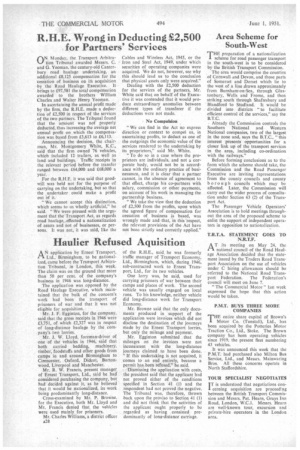R.H.E. Wrong in Deducting £2,500 for Partners' Services nN Monday,
Page 30

If you've noticed an error in this article please click here to report it so we can fix it.
the Transport Arbitra tion Tribunal awarded Messrs. C. and G. Yeoman, the century-old Canterbury road haulage undertaking, an additional £8,125 compensation for the cessation of business On it acquisition by the Road Haulage Executive. It brings to £97,581 the total compensation awarded to the brothers William Charles and Walter Henry Yeoman.
In ascertaining the annual profit made by the firm, the R.H.E. made a deduction of £2,500 in respect of the services of the two partners. The Tribunal found that the amount was not properly deducted, thus increasing the average net annual profit on which the compensation was based from £3,613 to £6,113.
Announcing the decision, the chairman, Mr. Montgomery White, K.C., said that the firm owned 76 vehicles, which included 12 trailers, as well as land and buildings. Traffic receipts in the relevant period before the transfer ranged between £64,000 and £68,000 a year. For the R.H.E. it was said that goodwill was held not for the purpose of carrying on the undertaking, but so that the undertaker could make a profit out of it.
" We cannot accept this distinction, which seems to us wholly artificial," he said. "We were pressed with the argument that the Transport Act, as regards road haulage,, effected a nationalization of assets and not of businesses, or persons. It was not, it was said, like the Cables and Wireless Act, 1945, or the Iron and Steel Act, 1949', under which securities of operating companies were acquired. We do not, however, see why this should lead us to the conclusion that physical assets only were acquired."
Dealing with the £2,500 deduction for the services of the partners, Mr. White said that on behalf of the Executive it was contended that it would produce extraordinary anomalies between different types of transferer if the deductions were not made.
No Compulsion
"We can find in the Act no express direction or context to compel us, in ascertaining profits, to deduct as one of the outgoings the economic value of the services rendered to the undertaking by its proprietors," said Mr. White.
"To do so in a case where the proprietors are individuals, and not a corporate body, would not be in accordance with the ordinary practice of businessmen, and it is clear that a partner cannot, in the absence of agreement to that effect, charge his co-partners with salary, commission or other payments, on account of his work in managing the partnership business.
" Wc take the view that the deduction of £2,500 from the profits, upon which the agreed figure of compensation for cessation of business !is based, was wrongly made and that, in this 'respect, The relevant provisions of the Act have not been strictly and correctly applied."




























































































